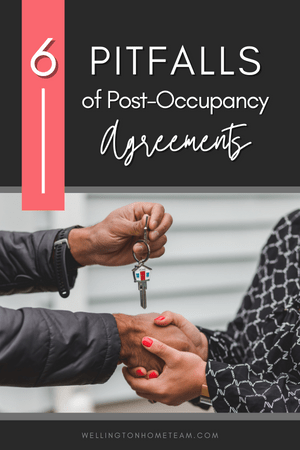Post Occupancy | What Is It and Should a Buyer Allow It?
When moving home, aligning timelines can be difficult. This can mean that the seller has a gap between selling their old home and closing on the new one.

To deal with this problem, the seller might ask the buyer for a post occupancy agreement. But what are post-occupancy agreements, and should you agree to one?
What is a Post Occupancy Agreement?
A post occupancy agreement allows the seller to stay on in the property after closing. Often referred to as rent-back, the agreement gives the seller more time to sort out their new living arrangements.
It can also be used to allow children to finish the school year, or simply help the seller avoid a rushed move. This arrangement will be very beneficial to the seller, allowing them to remain in the home as a tenant after they have received the cash at closing.
In a seller’s market, there can be some pressure on the buyer to go along with this type of agreement to secure the home they want. However, it could be a very risky situation for the buyer.
The Pitfalls of Post-Occupancy
When the seller continues to live in the home after closing, all of the risks lie with the buyer. Many things can go wrong if you enter into this arrangement, let’s take a look.
Rent Problems
The rent might not be paid when it’s due. If the agreement requires the seller to pay rent, what will happen if they don’t? It could leave the buyer out of pocket for mortgage payments, utilities, and other expenses.
Over Staying Their Welcome
The seller might not leave when agreed. When the occupancy agreement ends, the seller might remain in the property. This will cause problems for the buyer, meaning they have to change their plans and cause additional expenses to remove the occupant.
 Taking Too Much
Taking Too Much
When the seller does leave the property, they might not leave everything in the home that they should. They might take things, like appliances, that were supposed to be left for the buyer. This is another thing that will cause unexpected costs for the buyer.
Trashing the Property
Even if the seller does leave when they should without taking more items from the property than was agreed to, will the home be in the condition expected? You could walk into the home only to find the seller has caused a large amount of damage that will cost thousands of dollars to fix.
Liability
You could be sued. As the owner of the property, you could be held responsible if someone is injured on the premises. If there isn’t insurance to adequately cover this liability, it could be a serious problem for the buyer.
Fire Protection
If the home burns down, does the seller have insurance to cover the cost of rebuilding the property, or will it be the buyer’s problem?
If you are buying or selling a home you may have heard about a post occupancy agreement but what is it and should you allow it? #realestate #postoccupancySteps Buyers Can Take to Protect Themselves
Despite all these potential and very serious problems, there are some things you can do as a buyer to protect yourself if you decide to agree to this arrangement.
Written Agreement
There should be a clear post-closing occupancy agreement that states the exact date and time you will gain possession. It should also clearly state the agreed condition of the home on that date, and what will happen if the terms of this agreement are not met.
If you do not have these things written down in an agreement, you could be setting yourself up for trouble.
Escrow Protection
Some of the proceeds from the sale, perhaps 1% or 2% of the purchase price, should be put into escrow towards a security deposit for your safety. The details of this escrow arrangement need to be established in the agreement.
Items like who will be responsible for holding the escrow funds and when they will be released need to be addressed. Also, what will the next steps be if the seller damages the property, takes appliances, doesn’t pay rent, or vacate the premises on time?
Some post occupancy agreements are general and assume all will go right. Unfortunately, buyers need to assume things will go wrong and make sure they’re protected.
 Insurance
Insurance
The seller should pay insurance for the home and their possessions while living there. However, since they no longer own the home, it’s unlikely that they can simply continue paying their homeowner’s insurance policy since they no longer have a vested interest in the property. Also, the buyer can’t use a standard owner-occupied insurance policy either, since they are not living in the home.
For the buyer’s protection, they should request proof that the seller has adequate insurance at closing for the time they’ll be occupying the home. The buyer needs to make sure they have the proper insurance coverage as well.
Rent Payments
Since you have closed on the home, the seller should be paying rent to you. Requesting payment in advance is a good idea to reduce your risk. The daily, weekly, or monthly rental rate could be the market value rate. However, many buyers tend to give the seller a discount.
Penalty Fees
If the seller breaches the occupancy agreement, there should be a penalty. The amount they will need to pay should be large enough to incentivize them to avoid breaching the agreement.
When the seller doesn’t stick to the agreement, the penalty fee will be taken from the escrow. If you don’t want the seller to stay in the home beyond the agreed period, perhaps a penalty of $500 per day will make sure they leave on time.
If they damage the property during their occupancy, the cost of the damages can also come out of the escrow funds. There might be laws governing spending escrow funds, so you need to check this with your attorney.
Walk-through Inspection
Along with the normal walk-through inspection before closing, another walk-through should be completed before escrow is released to the seller, which is sometimes referred to as post occupancy evaluation process. This can happen after they have moved out, and if you find anything wrong, it should be documented. Photos and videos can be used as proof to reduce the chance of problems.
Final Thoughts
If you are buying a home and the seller wants to remain in the property, understanding what the risks are and what you should do to avoid them is very important.
Post settlement occupancy agreements should be drafted by a real estate attorney to make sure you are property protected in this type of situation. The terms of the agreement need to be finalized and the document signed by all parties before closing to avoid problems later on.
Please consider spreading the word and sharing; Post Occupancy | What Is It and Should a Buyer Allow It?
If you are buying or selling a home you may have heard about a post occupancy agreement but what is it and should you allow it? #realestate #postoccupancyAbout the Author
Top Wellington Realtor, Michelle Gibson, wrote: “Post Occupancy | What Is It and Should a Buyer Allow It?”
Michelle has been specializing in residential real estate since 2001 throughout Wellington Florida and the surrounding area. Whether you’re looking to buy, sell or rent she will guide you through the entire real estate transaction. If you’re ready to put Michelle’s knowledge and expertise to work for you call or e-mail her today.
Areas of service include Wellington, Lake Worth, Royal Palm Beach, Boynton Beach, West Palm Beach, Loxahatchee, Greenacres, and more.

 Michelle Gibson of the Hansen Real Estate Group Inc is a full-time REALTOR who has been specializing in Wellington Florida real estate since 2001. This veteran of the real estate industry has expertise in technology, marketing, and social media.
Michelle Gibson of the Hansen Real Estate Group Inc is a full-time REALTOR who has been specializing in Wellington Florida real estate since 2001. This veteran of the real estate industry has expertise in technology, marketing, and social media.